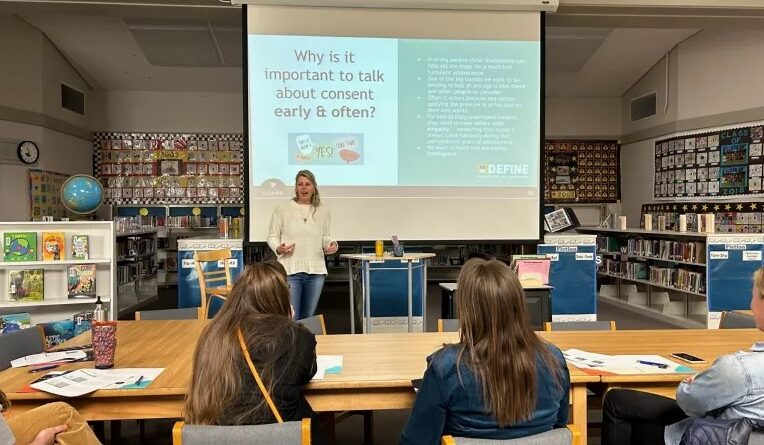When Christina Kaviani’s son, 6, doesn’t want to hug a grandparent or friend, Kaviani goes against some parenting methods and doesn’t make him.
To her, it’s a matter of consent.
As an educator on healthy relationships, consent is at the heart of what she teaches. Kaviani is a professor in the Women’s, Gender and Queer Studies Department at Cal Poly San Luis Obispo who also works with a nonprofit to guide local parents in teaching their children about consent and healthy relationships. The goal is to create stronger families and prevent relationship violence.
“I’m just encountering so many parents that have no idea about how to have these conversations, and they need guidance,” Kaviani said.
Kaviani helped The Lumina Alliance, a San Luis Obispo intimate partner violence advocacy, education and prevention organization, create the ReDefine Parenting Program in 2020.
Top of Form
Bottom of Form
Workshops provide parents and caregivers with the tools to teach their kids about healthy and respectful relationships during their adolescence, to help prevent intimate partner violence before it begins. The workshops are provided primarily to parents of children in elementary school with the goal of setting a foundation for healthy relationships before they enter adolescence.
Approximately 1 in 11 female students and 1 in 15 male high school students experienced physical dating violence in the last year, according to the federal Centers for Disease Control and Prevention. Additionally, about 1 in 9 female and 1 in 36 male high school students experienced sexual dating violence.
However, through early education, intimate partner violence can be prevented.
Disrupting power imbalances
The ReDefine Parenting Program is designed to encourage discussion and help parents, caregivers and children to avoid being bystanders when they hear or see abusive behavior. The goal is to provide them with the tools to feel empowered to speak up.
Often, sexual violence and intimate partner violence exist because of an imbalance of power, whether that imbalance is between individual partners or entire social groups.
According to the World Health Organization, in many societies, prevailing attitudes and traditional beliefs that women are subordinate to men serve to justify, tolerate or condone violence against women, and then blame women for the violence they experience.
Additionally, according to a 2019 study published in the journal ScienceDirect, children who have experienced abuse or neglect have a higher risk of becoming the victim or perpetrator of intimate partner violence. By beginning education at the parental level, the ReDefine Parenting Program works to break down the structures of power and abuse that often exist due to societal gender norms and generational trauma, and ultimately break cycles of abuse.
The Lumina Alliance’s Community-Based Prevention Programs Manager Callie Tennock said that their goal with the ReDefine Parenting Program is to help parents expose their children to these systems of power and talk about why they’re harmful.
“We’re trying to make sure that information is out there so that people understand what healthy decisions are and how to make them,” Tennock said. “We can help disrupt the social systems of power imbalances and we can see a disruption of violence altogether on the individual and relationship level, and also, on a social and cultural level.”
According to the CDC, promoting healthy and nonviolent relationships can help reduce the occurrence of intimate partner violence. Additionally, they say that early education can help prevent the harmful and long-lasting effects of violence on individuals, families and communities.
Teaching consent and boundaries
This year, the Lumina Alliance received a $600,000 grant from the CDC to expand the ReDefine Parenting program over the next five years. The program consists of workshops that are facilitated by the Lumina Alliance but are held and run by parents. The workshops are created by Kaviani and Jane Pomeroy, chief communications officer at the Lumina Alliance.
“If you’re talking about working with children in particular, what we know is that a one-time ‘sex talk’ doesn’t work,” Pomeroy said. “I think a lot of parents are afraid that if you talk to kids about sex, you’re encouraging them to have sex. The reality is, the more information that we can give them in a way that’s digestible and age appropriate, the sooner the better.”
Parent champions are trained on the curriculum before they go into school spaces where they host the workshops for other parents to join. The workshops are about consent, bodily autonomy, healthy masculinity and boundaries. Additionally, they provide tips on how to have conversations with children about these sometimes stigmatized topics.
So far, the workshops have been held at three schools in San Luis Obispo, and approximately 15-20 parents have attended each meeting.
Parents can attend as many or as few of the workshops as they would like, and childcare and Spanish translation services are available on site to help break down any barriers that would prevent people from attending.
Pomeroy said that while the specific data surrounding the effectiveness of the program is not yet available, they have found that by including parents in these discussions they have been able to reach a wider audience and spread more awareness.
As the project progresses, the participating parents will act as primary data sources by taking surveys and attending focus groups that will inform evaluation, improvement plans and barriers to be addressed in future programming.
The ReDefine Parenting Program teaches caregivers how to talk to kids about consent and boundaries to prevent violence. It focuses on how kids can set their own boundaries in relationships and friendships, beginning at the elementary level.
In order to help children understand healthy boundaries and feel comfortable talking about these topics, parents and caregivers should initiate age-appropriate discussions during early childhood. Providing parents with the tools to discuss consent at a young age can be as simple as teaching their children how to say “no” when they don’t like the way somebody is touching them and additionally, respecting when somebody says that they don’t like the way you’re touching them.
The program is designed to help lay the groundwork for children to understand what consent is, before it becomes something that is only correlated with sex.
“We’re not talking about talking to elementary kids about sex, that’s more for middle and high schoolers,” Pomeroy said. “It sounds complicated and scary, but really, it’s like me talking to my son about how he doesn’t have to finish his dinner if he doesn’t want to. He’s in charge of his body.”
While the ReDefine Parenting Program is a San Luis Obispo-based organization that currently only works with a few schools, because it is a community-based program, it can be tailored to fit any community or school.
The program is not proprietary and if any other schools or organizations want to replicate what the ReDefine Parenting Program is doing, they are more than willing to share their materials, Pomeroy said.
“I think it’s honestly, really, really important for parents to just have less isolation and have places to talk,” Kaviani said. “I think it can be replicated anywhere and I would want it to be too.”
Tips for talking to your child about consent:
- Understand boundaries and triggers during the conversation — respect your own boundaries as well. If there is a topic such as sex or bodily autonomy that makes you or your child uncomfortable, voice your concerns and be transparent. Take your time and don’t force the conversation.
- You can start talking to your child about consent from as early as ages 1-5, focusing on the importance of bodily autonomy.
- To make the conversation age appropriate, for elementary school kids, you can teach them to ask for permission before touching or embracing a playmate.
- Ask your child what they already know about consent, sex and relationships and ask them if they have any questions.
- Let your child know that their body belongs to them and that they get to decide what happens with their body.
- Emphasize that no one should touch them without permission and that they should not touch someone else without permission.
- Consent can be practiced by respecting your child when they say, “I don’t want to share that toy right now,” rather than forcing them to share, asking your child if they would like a hug before initiating physical contact or asking if it’s okay if you sit beside them.
- With older children, starting in middle school and continuing through high school, you can start talking about how their bodies and minds are changing and start incorporating consistent information about consent. At this age, sex, kissing and handholding are topics that should be talked about. Discuss drinking and managing actions while under the influence, and to ensure secure non-violent masculinity, call out “locker room talk” and sexist language.
- For all age levels, explain that it is not impolite or rude to set boundaries if they do not like the way someone is touching or treating them. Teach them that respecting boundaries is a way to show others that they care.






